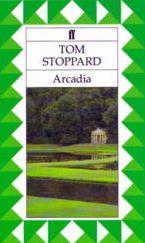 Authored by:
Authored by:
Rebecca Weaver Rinehart
Preaward Specialist
University of Northern Iowa
Email:rebecca.rinehart@uni.edu
This series of articles explores literary works that intersect with our professional interests in research, research administration, and university life.
 Was the last play you read Romeo and Juliet in 11th grade English? If so, let me recommend a work by my favorite modern playwright, Tom Stoppard.
Was the last play you read Romeo and Juliet in 11th grade English? If so, let me recommend a work by my favorite modern playwright, Tom Stoppard.
Arcadia, which premiered in 1993, is set in one room of an English country house, but shifts back and forth in time between the early 19th century and the present day. In the present, two literary historians compete and collaborate to publish their discoveries about the earlier period, while a third researcher, a mathematical biologist, is trying to derive an equation for population dynamics. In the 19th century, a precocious girl speculates on new mathematical ideas while the adults, including a visiting Lord Byron, carry on a very funny series of literary and romantic intrigues.
Stoppard, a master of wordplay, is known for incorporating scientific and philosophical ideas into his works. Arcadia explores the mathematics of the natural world, the second law of thermodynamics, and the transition from Enlightenment to Romantic aesthetics as expressed in literature and landscape design. It namechecks Fermat’s last theorem and Ada Lovelace as well as Caroline Lamb and Lord Byron. In moving between the centuries, it explores how knowledge is discovered and rediscovered, understood and misunderstood, and what is lost to time forever.
One of the many questions this play asks is what is more important in our struggle to understand ourselves and the world - science? Humanities? Both? Neither?
As anyone in the research world knows, science comes out ahead in dollars. The antipathy that this sometimes inspires in other fields is articulated by Bernard, the literature professor, who argues: “Why does scientific progress matter more than personalities? … Quarks, quasars – big bangs, black holes – who gives a s---? How did you people con us out of all that status? All that money? And why are you so pleased with yourselves?” (Act II, Scene 5).
On the other hand, Valentine, the mathematician, movingly describes the awe and excitement of a new era of discovery: “It makes me so happy. To be at the beginning again, knowing almost nothing. … The ordinary-sized stuff which is our lives, the things people write poetry about … these things are full of mystery, as mysterious to us as the heavens were to the Greeks. … It’s the best possible time to be alive, when almost everything you thought you knew is wrong” (Act I, Scene 4).
These views are simultaneously negated and affirmed by Hannah, the intellectual center of the play, when she says “It’s all trivial … Comparing what we’re looking for misses the point. It’s wanting to know that makes us matter” (Act II, Scene 7).
It’s impossible to sum up the intellectual richness, the wit, and the final emotional impact of this play. It rewards repeated readings – give it a first one and you won’t be disappointed.
Reference
Stoppard, Tom. Arcadia. Faber and Faber, 1993.
#insights#Membership